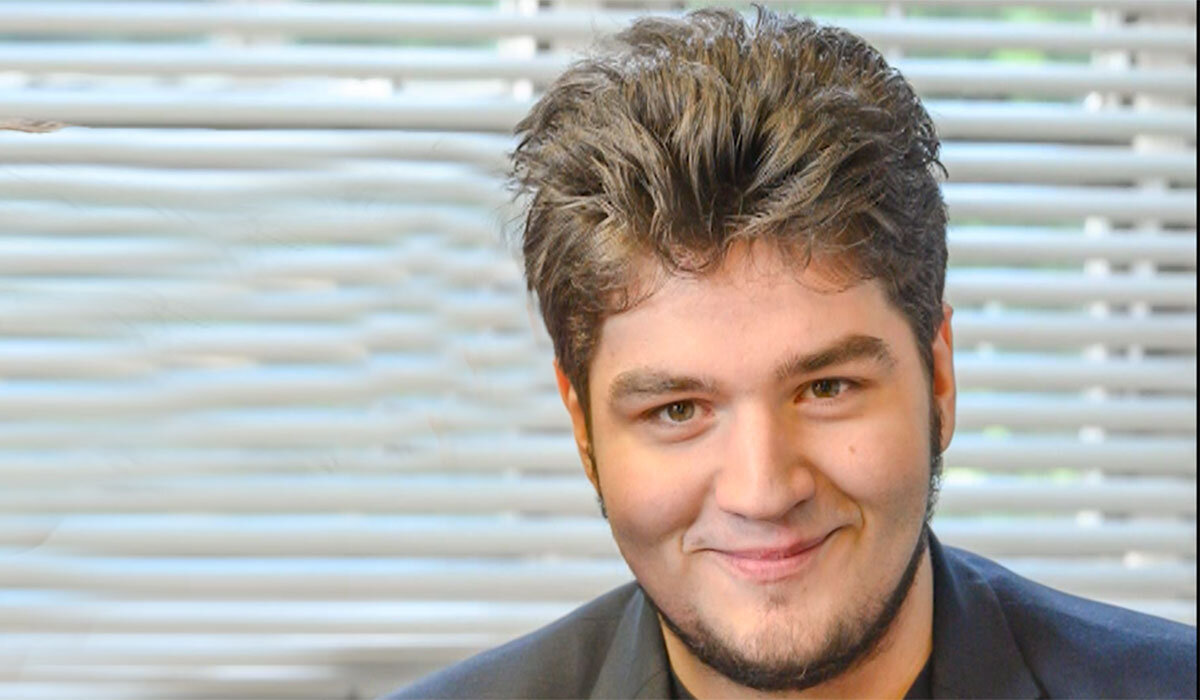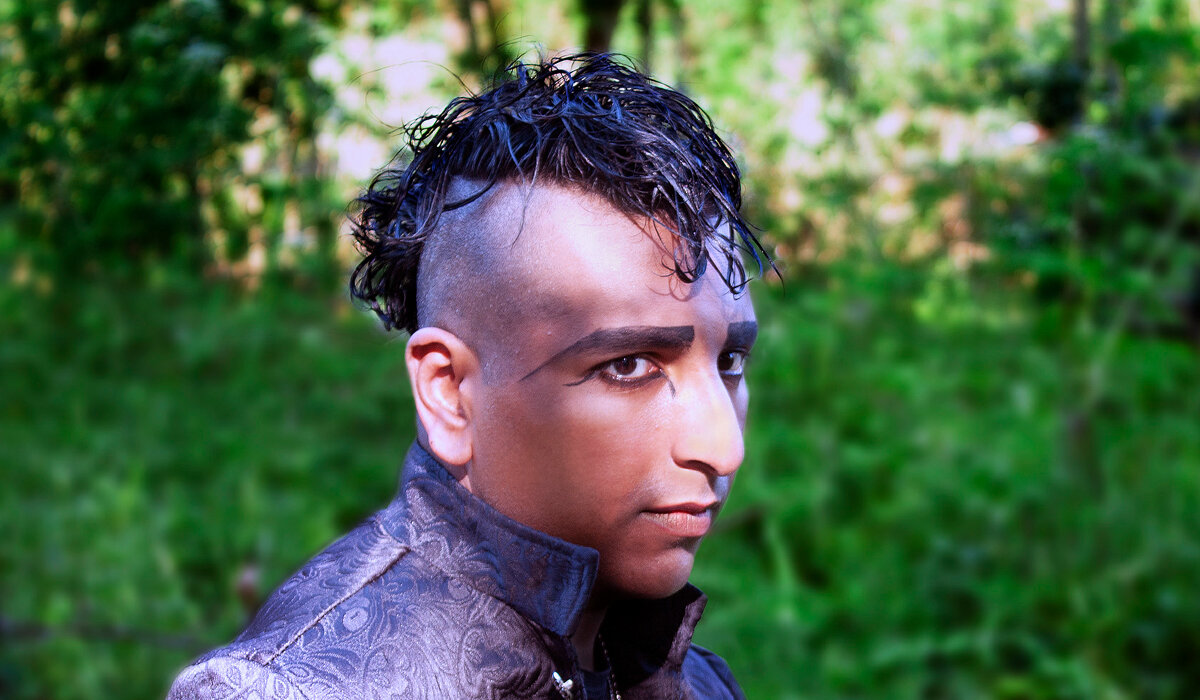
"The A Word has broadened people's minds and inspired them to find out more about autism."
Travis George Smith
- on acting in the BBC drama, 'The A Word'
Stories from the Spectrum: Travis George Smith
We’re really excited that BBC One’s The A Word has returned for a third series. For those who haven’t watched it, The A Word is a family drama TV series with an autistic twist. The plot focuses primarily on Paul and Alison Hughes, whose son Joe is on the spectrum.
With the series back on our screens, we caught up with autistic actor Travis George Smith. Travis plays Mark, a young autistic man who we meet in series two of The A Word. He chatted to us about portraying an autistic character, his own experience of life on the spectrum, and why everyone should watch The A Word…
When were you diagnosed as autistic?
I was about eight when it actually came about. My mum was basically stopped by a teacher at my primary school, who asked her, ‘have you ever heard of Asperger syndrome and autism?’. I’m very lucky, as my mum has worked with people with learning disabilities and autism all her life. Before I was even three-years-old she suspected I might be on the spectrum. She was so relieved to hear someone else finally say it out loud. Before that, she’d spent her time thinking, ‘he can’t be autistic, I must be crazy’, but it turned out she was right. I was diagnosed about a year later. Having my mum with me to explain the process really helped me.
At the time I didn’t really understand much about autism. I was more concerned with collecting power rangers to be honest! I didn’t really get it, but as soon as I heard the word ‘autistic’ leave my mum’s mouth, I was intrigued. My journey towards understanding myself began there.
What is being autistic like for you?
It was tough in my younger years. As cliched as it sounds, I always felt like the odd one out in school. I was an easy target for bullies, partly because I was big. The other children didn’t really ‘get’ me. They didn’t know I was autistic, or what autism was. Making friends was impossible. I spent the majority of playtime and lunchtime by myself.
Thing have become easier, now that I’m older. I’m 19 now. I’m learning to embrace everything – the pros and the cons of being autistic, and finding the beauty in all of it.
I still struggle with things like anxiety and depression. I love being a part of The A Word, but there are times when I question myself and my abilities. When that happens, I have to try and shut those thoughts out and tell myself that I’m here for a reason.
How did you get into acting?
Drama was one of the few lessons in school that I actually enjoyed. I always really struggled with self-loathing and spent a lot of my time at school trying to be somebody else. I thought if I could convince myself that I was somebody else, maybe I could get through the day.
Even though drama was my favourite subject, it was also a necessity for me. It became the one coping mechanism I had. I loved every second of acting. I love being able to step into someone else’s shoes and see the world from a different perspective.
How did you get involved with The A Word and what was the audition process like?
I was in quite a dark place in my life at the time. I’d just finished school, and it was pretty obvious I wasn’t going to leave with much of an education or much to my name. It was very scary.
My mum knew better than anyone that acting was what I wanted to do, but I didn’t know how to get there. She follows a lot of autistic people online, and talks to people on there. One evening she found an open casting call for the character of Mark on The A Word, and suggested I give it a go.
The audition was in London (we’re based in South Wales), and my initial reaction was, ‘No. There’s no way I’m letting you drive me all the way to London for a part I have no chance of getting.’ My self-confidence was in the bin at that point. After a few hours, she convinced me to do the audition.
We drove down to London a few weeks later for the audition. It was a lovely environment – very relaxed and welcoming. A month later, I got a call and was told I had got the role. Everything has changed since then. It’s amazing.
Could you tell us a bit about your character, Mark, in The A Word? Do you draw upon your own experiences of being autistic when portraying him?
When I was cast as Mark in series two, I knew I wanted to draw from my past experiences when portraying him. The way Mark is written, and the way he was eventually portrayed, felt very similar to me when I was younger. I resonate with him a lot. In some ways, I wasn’t acting but going back in time. For instance, there is a scene in series two where Mark goes to a gig for the first time. This really resonated with me. It reminded me of going to the theatre for the first time, when I was 15. It was magic, I felt like I was in heaven. I felt like Mark was feeling the same way when he went to the gig to see his favourite band. He could finally let loose and get involved in something.
There is also a scene in series two where we see Mark having a meltdown. This really resonated with me. It wasn’t difficult in the moment, as I was just so focused on getting it right and making it look as authentic as possible. As soon as the day was over, and I got back to my hotel, I was in floods of tears. I think that was actually a good thing. Filming that scene was a way of me facing the hardships of my past and putting it behind me.
Do you have any advice for aspiring autistic actors?
I would give them the same advice I’d give any other actor. I’m aware that I’m extremely lucky to have been given the chance to be in The A Word. For the rest of my career, I’ll thank the show’s team for that.
It’s a tough business to get noticed in, especially with so many people who want to get into it now. My advice would be to keep going. Keep knocking on doors until your knuckles are bloody, and then keep on knocking! Stay determined no matter what. When you do get that chance, take it.
As an actor, if something isn’t working on screen, talk to the people you are working with about it, and be kind and professional. Stay calm. Don’t let the anxiety get to you, and love every second of what you do.
Why is it important that people who don't know a lot about autism or don’t have any personal experience of autism watch The A Word?
One of the best things about The A Word is that it has something for everybody. It’s a family drama really. I love the realism of the show, I was a fan before I became a cast member. I remember watching it and thinking, ‘finally, somebody is telling my story’.
The show has elements that draw you in, whether you have a connection to autism or not. For example, the soundtrack is brilliant. I think everyone loves a good family drama, and The A Word is a family drama with a wonderful story. It offers such a realistic interpretation of autism, that you can’t help but walk away with some sort of understanding of what being autistic is like.
I have a lot of friends who knew nothing about autism before watching The A Word. They knew I was on the spectrum, but didn’t really know anything about what that meant. This series interested them and made them want to learn more. Now they’re asking me questions about what being autistic is like for me. The A Word has broadened their minds and inspired them to find out more about autism, as well as disabilities in general. The show educates as well as entertains. It has changed my life, both as a viewer and as a cast member. I would encourage everyone to watch it.
"The A Word has broadened people's minds and inspired them to find out more about autism, as well as disabilities in general."

How are you coping with the current lockdown? Do you have any tips for autistic people who might be struggling at the moment?
It’s a tough one, because it’s just such an unprecedented situation. I’m in a really lucky position, as I can stay at home and take care of my mum. We’ll be ok, but I have friends who are really struggling – both autistic and non-autistic. This situation is affecting people with different needs in different ways.
For my autistic friends in particular, the schedule they’ve built up for themselves (before the lockdown) has been completely shattered. There are so many different things being said. I’m not a member of the government or a medical professional, so I have no right to be giving scientific advice about this! I’d just say, listen to the right people. Listen to the government, and try to stay positive. This situation may last for a while, but it will end. Don’t be afraid to reach out to people. We shouldn’t have to face a situation like this alone.
Visit our coronavirus guidance pages
As coronavirus continues to disrupt lives across the world, many people are feeling anxious about what the future holds. To support you through this period of uncertainty, we've put together a collection of handy tips, news updates, resources, and contact details.
Similar stories

"I know what colour or shape I'm feeling, but I often struggle to express myself with words."
Patrick Samuel
- on expressing himself through art and music
Read more

The Spectrum magazine
Explore one of the UK's largest collections of autistic art, poetry, and prose. The Spectrum magazine is created by and for autistic people, and is available both online and in print.
Read the Spectrum





You are not alone
Join the community
Our online community is a place for autistic people and their families to meet like-minded people and share their experiences.
Join today